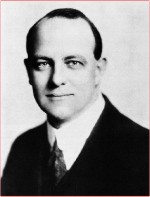| Author Profile
P. G. Wodehouse
Compiled by Mahdin Mahboob
 P G Wodehouse is a name that needs no introduction. Regarded as one of the best English comic writers of all times, Wodehouse would remain forever immortal for characters like Jeeves and his master Bertie Wooster. One of the most popular internet search engines, 'ask.com', originally known as 'askjeeves.com' is also based on the popular character Jeeves created by Wodehouse. P G Wodehouse is a name that needs no introduction. Regarded as one of the best English comic writers of all times, Wodehouse would remain forever immortal for characters like Jeeves and his master Bertie Wooster. One of the most popular internet search engines, 'ask.com', originally known as 'askjeeves.com' is also based on the popular character Jeeves created by Wodehouse.
Born as Pelham Grenville Wodehouse on 15th October 1881 , Sir P G Wodehouse has enjoyed enormous popular success for more than seventy years. Wodehouse was an acknowledged master of English prose, admired both by contemporaries like Hilaire Belloc, Evelyn Waugh and Rudyard Kipling and by modern writers like Douglas Adams, Salman Rushdie, Christopher Hitchens and Terry Pratchett.
Best known today for the Jeeves and Blandings Castle novels and short stories, Wodehouse was also a talented playwright and lyricist who was part author and writer of fifteen plays and of 250 lyrics for some thirty musical comedies.
Wodehouse, called "Plum" by most family and friends, was born to Henry Ernest Wodehouse (a British judge in Hong Kong) and Eleanor Wodehouse. He attended boarding school, where he saw his parents only once every six or seven months. Wodehouse grew very close to his brother, who shared his love for art. Wodehouse filled the voids in his life by writing relentlessly. He spent quite a few of his school holidays with one aunt or another; it has been speculated that this gave him a healthy horror of the 'gaggle of aunts', reflected in Bertie Wooster's formidable aunts Agatha and Dahlia, as well as Lady Constance Keeble's tyranny over her many nieces and nephews in the Blandings Castle series.
He was educated at Dulwich College, London where the library is now named after him, but his anticipated progression to university was stymied by family financial problems. Subsequently he worked for the Hong Kong and Shanghai Bank in London (now known as HSBC) for two years, though he was never interested in banking as a career. He wrote part-time while working in the bank, eventually proving successful enough to take up writing as a full-time profession. He was a journalist with The Globe (a defunct English newspaper) for several years before eventually going to Hollywood, where he earned enormous amounts as a screenwriter. Many of his novels were also serialised in magazines such as The Saturday Evening Post and The Strand.
Although Wodehouse and his novels are considered quintessentially English, from 1924 on he lived largely in France and the United States. He was also profoundly uninterested in politics and world affairs.
Together with his wife he moved permanently to New York after the war. Apart from Leonora, who died during Wodehouse's internment in Germany, they had no children. He became an American citizen in 1955 and never returned to his homeland, spending the remainder of his life in Remsenburg, Long Island.
He was made a Knight Commander of the Order of the British Empire (KBE) shortly before his death at the age of 93. It is widely believed that the honour was not given earlier because of lingering resentment about the German broadcasts. In a BBC interview he said that he had no ambitions left now that he had been knighted and there was a waxwork of him in Madame Tussaud's Wax Museum.
Many consider Wodehouse as second only to Charles Dickens in the creative skills of character invention. His characters however were not always popular with the establishment, notably the foppish foolishness of Bertie Wooster. His 'mentally negligible' good-natured characters invariably make their lot worse by their half-witted schemes to improve a bad situation.
In a manner going back to the stock characters of Roman comedy (such as Plautus), Wodehouse's servants are frequently far cleverer than their masters. This is quintessentially true with Jeeves, who always pulls Bertie Wooster out of the direst scrapes.
Although his plots are on the surface formulaic, Wodehouse's genius lied in the tangled layers of comedic complications that the characters must endure to reach the invariable happy ending. Typically, a relative or friend makes some demand that forces a character into a bizarre situation that seems impossible to recover from, only to resolve itself in a clever and satisfying finale. The layers pile up thickly in the longer works, with a character getting into multiple dangerous situations by mid-story. An outstanding example of this is Code of the Woosters where most of the chapters have an essential plot point reversed in the last sentence, catapulting the characters forward into greater diplomatic disasters.
Both the Blandings and Jeeves stories by Wodehouse have been adapted as BBC television series: the Jeeves series has been adapted twice, once in the 1960s (for the BBC), with the title World of Wooster, starring Ian Carmichael as Bertie Wooster, and Dennis Price as Jeevesand again in the 1990s (by Granada Television for ITV), with the title Jeeves and Wooster, starring Hugh Laurie as Bertie and Stephen Fry as Jeeves.
Copyright
(R) thedailystar.net 2007 |
